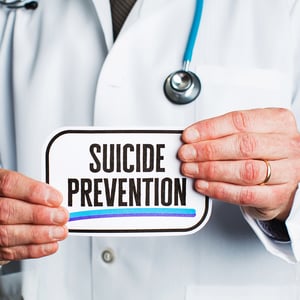As of December 2021, almost 50 million cases of COVID-19 have been reported to the U.S. Centers for Disease Control and Prevention (CDC) with close to 800,000 deaths from the disease. Unfortunately, the pandemic is not the only crisis the healthcare industry is facing right now. In light of the current increased burden on the healthcare system,...
Mental Health: What You Can Do to Help
It’s important to take time to reflect on our mental health and encourage others, including: colleagues, family members and friends to do the same. In partnership with the National Alliance on Mental Illness (NAMI), Concordance Healthcare Solutions wants to share information and resources to help healthcare providers and patients. If you notice someone is exhibiting signs of poor mental health, you can help by reaching out and letting them know help is available. Read more below about mental health and suicide prevention in honor of World Mental Health Day which is held every year on October 10.
Mental Health
Mental health is related to how we handle stress and refers to our emotional and psychological state. Research from the National Institute of Mental Health shows that problems with mental health in the U.S. are very common, with mental illnesses affecting tens of millions of people each year. About one in five Americans will experience a mental illness at some point in their lives, while estimates suggest that only half of the people with mental illnesses receive treatment.
Mental illness is caused by a variety of factors including biological factors, stress and traumatic events. If a friend, colleague or family member is exhibiting signs of poor mental health, you can assist by reaching out and letting them know help is available. Mental health is sometimes met with negative attitudes and misinformation - take this quiz from the Centers for Disease Control and Prevention (CDC) to test your knowledge on mental health myths and facts.
Ending the stigma that is associated with mental health is a universal opportunity to help those suffering from mental illness. From depression to generalized anxiety disorders to suicidal thoughts, when we are more accepting and understanding, we give patients suffering from these conditions the opportunity to seek help.
Primary Care
Mental health issues can lead to suicidal thoughts and actions. In 2016, suicide was listed as the second leading cause of death for those aged 10-24, the third for those aged 25-44 and the ninth leading cause of death in the U.S., according to the CDC. It’s a common myth that suicide happens without warning, there are oftentimes many opportunities for intervention, especially from healthcare providers. Primary care providers are in a unique position to screen and identify patients for potential suicidal risks and provide them with helpful resources. Most patients are screened for mental health by answering a few basic questions at the beginning of a routine exam. Example: how are you feeling today? Answering this simple question helps primary care providers sense if there are any disturbances currently affecting a patient’s mental wellbeing.
Another screening method that physicians can utilize is a more targeted approach which focuses on an individual patient who may have a history of suicidal thoughts, mental illness or other risk factors. While universal screening consists of short generalized questions, targeted screening goes more in depth and may even discuss intentional self-harm actions and suicidal thoughts. Other than these two methods, there are many other types of screenings and testing primary care providers can use to assess a patient’s risk.
Suicide Prevention
World Mental Health Day is intended to improve mental health around the world. This year’s theme focuses on suicide prevention to help raise awareness and prevention efforts. According to the World Health Organization, someone loses their life to suicide every 40 seconds. Suicide affects all ages, ethnicities and genders. Those who are at risk may exhibit some of the following factors:
- Depression
- Withdrawal
- Substance abuse
- Aggressive behavior
- Prior suicide attempt
Dealing with a friend or loved one who is exhibiting suicidal thoughts can be difficult and intimidating. One way you can help is to learn more about warning signs and risk factors. If you suspect someone you know is suffering from suicidal thoughts, the best thing you can do is encourage them to get help and let them know you care. Offering a helping hand, without judgement, can help someone realize they’re not alone in their struggle.
Concordance Healthcare Solutions is passionate about providing medical supplies and cost-saving supply chain solutions to healthcare providers. We’re also dedicated to increasing mental health awareness and support by working with key suppliers to aid healthcare providers. Contact us today to learn how we can help you.
Helping you stay in the know
June is Men’s Health Month. This is an important time for healthcare providers to remind men of key factors that contribute to their overall health and how they can stay on top of certain health screenings. Below are some of the most common health risks for men.
February is an important time of year to focus on heart health. While stores, commercials and restaurants overwhelm us with hearts and romance reminders throughout Valentine season, there's more we can do for the ones we love than give them chocolate or candy hearts. Heart disease is the leading cause of death for both men and women in the U.S....




